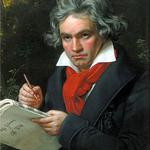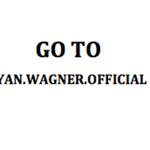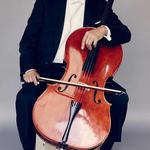
Ludwig van Beethoven
Ludwig van Beethoven (16th December 1770 Bonn, Germany -26th March 1827) was a composer of the transitional period between the late Classical and early Romantic eras.
Beethoven is widely regarded as one of the greatest masters of musical construction, sometimes sketching the architecture of a movement before he had decided upon the subject matter. He was one of the first composers to systematically and consistently use interlocking thematic devices, or "germ-motives," to achieve inter-movement unity in long compositions. Equally remarkable was his use of "source-motives," which recurred in many different compositions and lent some unity to his life's work. He made innovations in almost every form of music he touched. For example, he diversified even the well-crystallized form the rondo, making it more elastic and spacious, which brought it closer to sonata form.
Beethoven composed in a great variety of genres, including symphonies, concerti, piano sonatas, other sonatas (including for violin), string quartets and other chamber music, masses, an opera, lieder, and various other genres.
Beethoven's compositional career is usually divided into Early, Middle, and Late periods:
In the Early (Classical) period, he is seen as emulating his great predecessors Haydn and Mozart, while concurrently exploring new directions and gradually expanding the scope and ambition of his work. Some important pieces from the Early period are the first and second symphonies, the first six string quartets, the first three piano concertos, and the first twenty piano sonatas, including the famous "Pathétique" and "Moonlight" sonatas.
The Middle (Heroic) period began shortly after Beethoven's personal crisis centering around his encroaching deafness. The period is noted for large-scale works expressing heroism and struggle; these include many of the most famous works of classical music. Middle-period works include six symphonies (numbers 3 to 8), the fourth and fifth piano concertos, the triple concerto and violin concerto, five string quartets (numbers 7 to 11), the next seven piano sonatas (including the "Waldstein" and the "Appassionata"), and Beethoven's only opera, Fidelio.
Beethoven's Late (Romantic) period began around 1816. The Late-period works are characterized by intellectual depth; intense, highly personal expression; and formal innovation (for example, the op. 131 string quartet has seven linked movements, and the Ninth Symphony adds choral forces to the orchestra in the last movement). Works of this period also include the Missa Solemnis, the last five string quartets, and the last five piano sonatas.
On tour
No
Followers
345,809
Category
Classical Music, Classical
Similar Artists On Tour
About Ludwig van Beethoven
Ludwig van Beethoven (16th December 1770 Bonn, Germany -26th March 1827) was a composer of the transitional period between the late Classical and early Romantic eras.
Beethoven is widely regarded as one of the greatest masters of musical construction, sometimes sketching the architecture of a movement before he had decided upon the subject matter. He was one of the first composers to systematically and consistently use interlocking thematic devices, or "germ-motives," to achieve inter-movement unity in long compositions. Equally remarkable was his use of "source-motives," which recurred in many different compositions and lent some unity to his life's work. He made innovations in almost every form of music he touched. For example, he diversified even the well-crystallized form the rondo, making it more elastic and spacious, which brought it closer to sonata form.
Beethoven composed in a great variety of genres, including symphonies, concerti, piano sonatas, other sonatas (including for violin), string quartets and other chamber music, masses, an opera, lieder, and various other genres.
Beethoven's compositional career is usually divided into Early, Middle, and Late periods:
In the Early (Classical) period, he is seen as emulating his great predecessors Haydn and Mozart, while concurrently exploring new directions and gradually expanding the scope and ambition of his work. Some important pieces from the Early period are the first and second symphonies, the first six string quartets, the first three piano concertos, and the first twenty piano sonatas, including the famous "Pathétique" and "Moonlight" sonatas.
The Middle (Heroic) period began shortly after Beethoven's personal crisis centering around his encroaching deafness. The period is noted for large-scale works expressing heroism and struggle; these include many of the most famous works of classical music. Middle-period works include six symphonies (numbers 3 to 8), the fourth and fifth piano concertos, the triple concerto and violin concerto, five string quartets (numbers 7 to 11), the next seven piano sonatas (including the "Waldstein" and the "Appassionata"), and Beethoven's only opera, Fidelio.
Beethoven's Late (Romantic) period began around 1816. The Late-period works are characterized by intellectual depth; intense, highly personal expression; and formal innovation (for example, the op. 131 string quartet has seven linked movements, and the Ninth Symphony adds choral forces to the orchestra in the last movement). Works of this period also include the Missa Solemnis, the last five string quartets, and the last five piano sonatas.
Follow on Bandsintown
Genres
Classical Music, Classical
Frequently Asked Questions About Ludwig van Beethoven
Concerts & Tour Date Information
Is Ludwig van Beethoven on tour?
No, Ludwig van Beethoven is not currently on tour and doesn’t have any tour dates scheduled for
2026-2027. Browse related artists and follow Ludwig van Beethoven for the latest updates on
upcoming concert tours.








